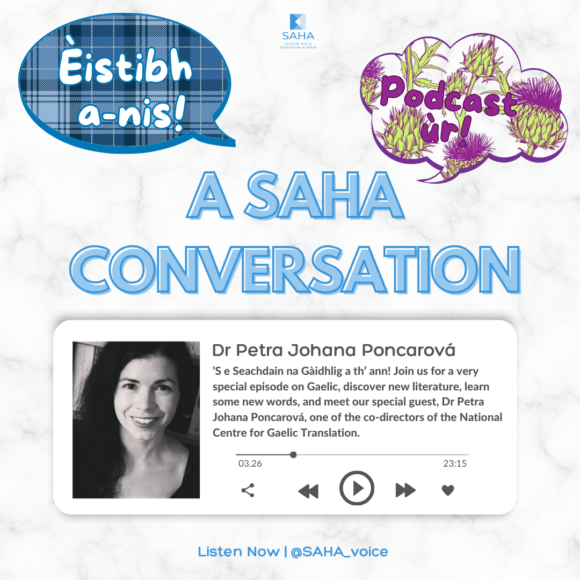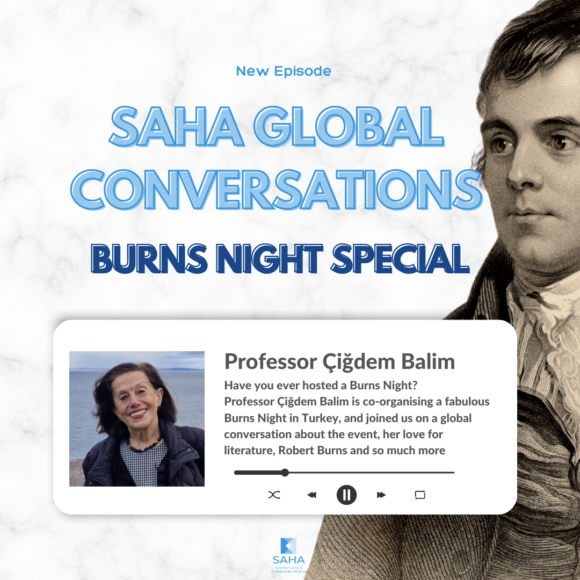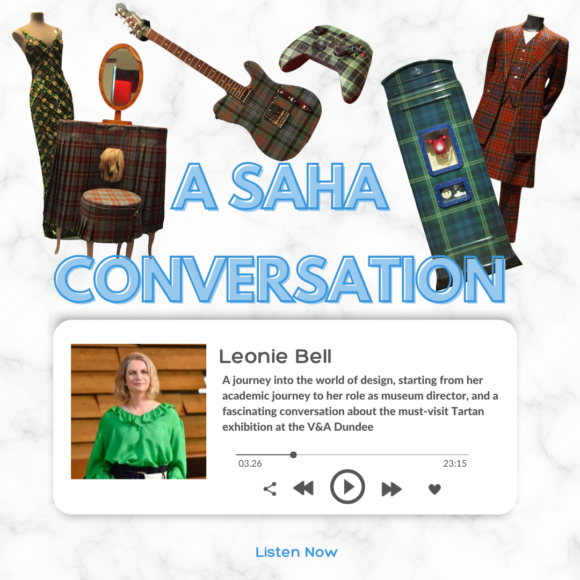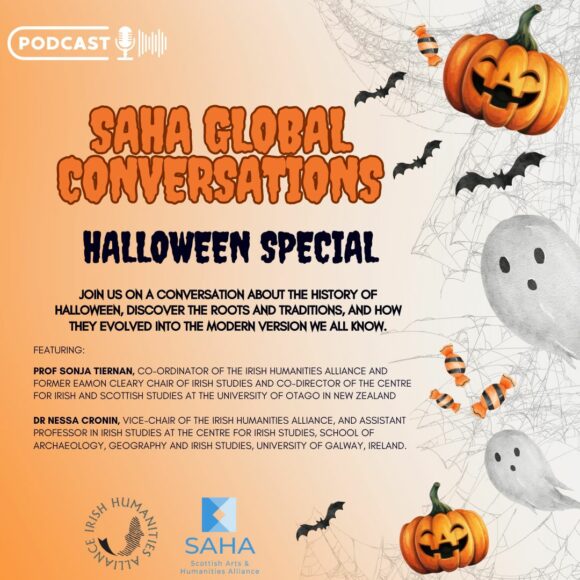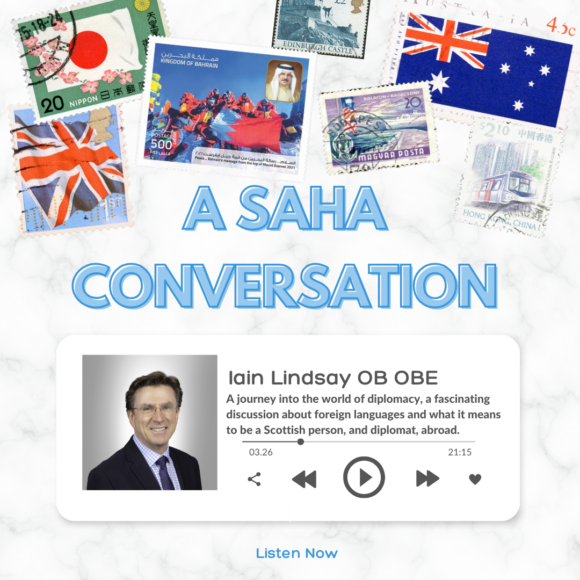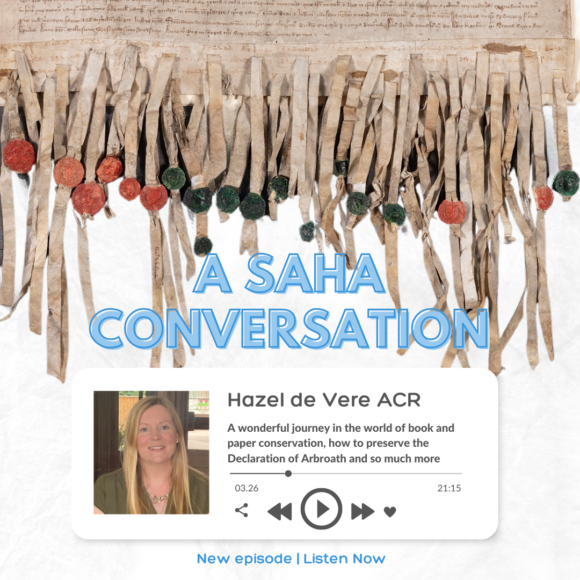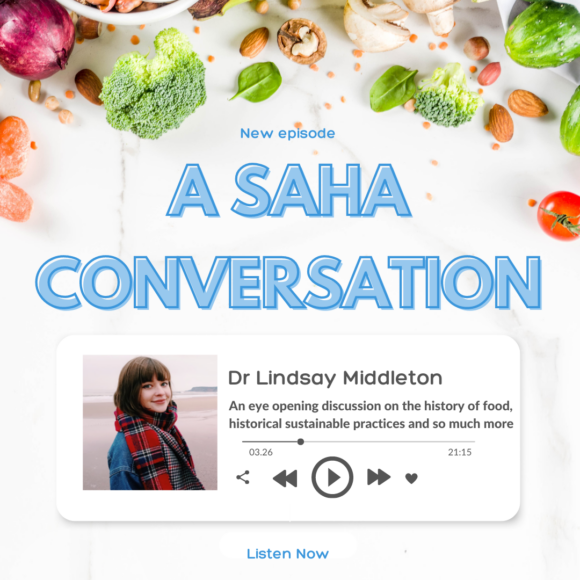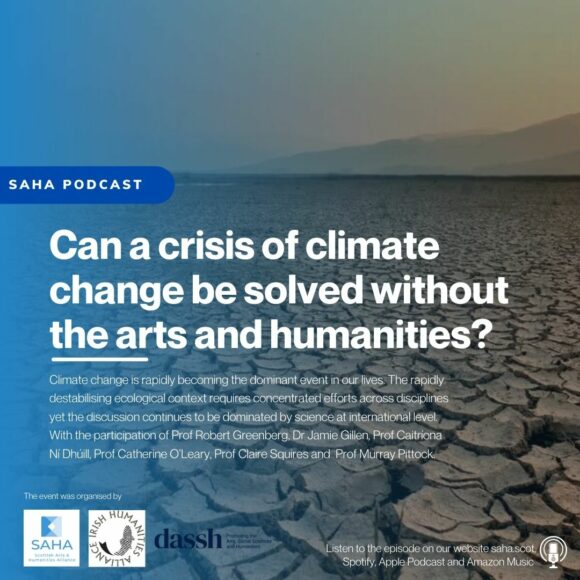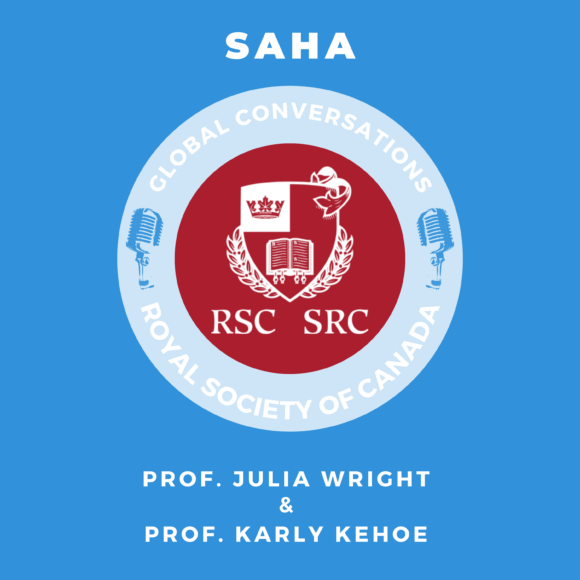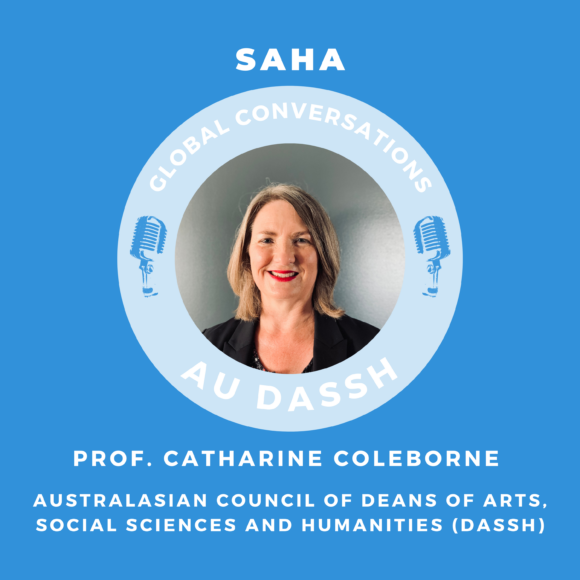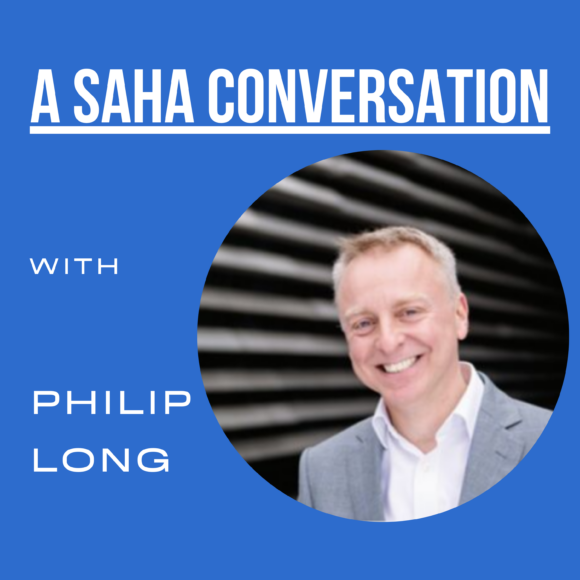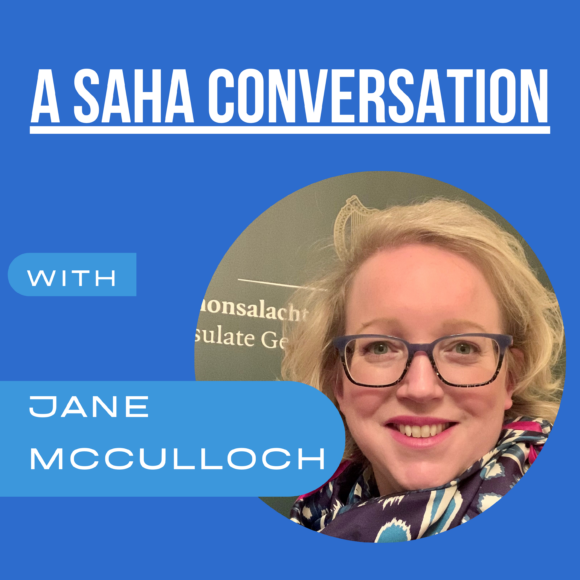We are delighted to bring you another SAHA Conversation. Our guest this week is Amina Shah. Amina is the National Librarian and Chief Executive of the National Library of Scotland. She has over 25 years’ experience across the library and literature sector, including both public and academic libraries. She was a previous Chief Executive of the Scottish Library and Information Council and Director of Programme at the Scottish Book Trust and is President of the Chartered Institute of Library and Information Professionals in Scotland and Visiting Professor at the School of Creative and Culture Business at Robert Gordon University. She is a Trustee of StAnza International Poetry Festival, Friends of the National Libraries, the Scottish Library and Information Council and the British Library Advisory Board. Amina has a strong interest in diversity and inclusion and the role libraries, literature and culture play in empowering individuals and communities.
As we discuss during our conversation, Amina has spent most of her life amongst books and our talk covers different topics related to books and libraries. The discussion also includes Amina’s reflections on the future of libraries and the various services libraries provide for their communities beyond access to their collections.
Resources mentioned:
A Living Proof: A Climate Story documentary
 Transcript
Transcript
[00:01:30] Cristina: Good morning and thank you for joining our SAHA conversation today, Amina.
[00:01:35] Amina: Good morning Cristina, very happy to be here.
[00:01:38] Cristina: To start our conversation today I wanted to ask you: your life has mostly been spent around books and I was wondering, how did your passion for this area develop?
[00:01:51] Amina: Well, um, yes, that’s right, my career and also in my personal life, I’m often surrounded by books and my mom was actually a library assistant and going right back my parents actually met in the Mitchell Library in Glasgow. My dad was a student and my mom was working there as a library assistant and they got married and moved to Pakistan and then we moved back to Scotland. And because my mom was familiar with libraries… She used to always take me to the library from a very young age. So I was really lucky in that respect, even though she wasn’t working in a library anymore, she really instilled in me a passion for reading and books. Not that she used to direct me to anything in particular, but just that they were always there, you know, we always went to the library. She was always reading herself, and I just kind of developed a real love and when I was younger, even going to library was one of the sort of independent activities that I used to do. So I used to love to go up to the library in Bruntsfield where I used to live when I was about 10. And, you know, I would go and get a packet of sweets from the shop on the corner and then walk up by myself and feel very grown-up. And, you know, that really opened my mind to opportunity, to be able to pick anything you want, it’s like entering a different world. And I just loved the, kind of the sense, the feeling that I got going into the library, the feeling that, you know, you belonged there, you could be there, you could hang out there for however long you wanted. You could browse shelves and find things maybe that were just exciting. And then, as I was older, I used to use the library to study. So we moved down to England at that time and I used to go to Bradford library to study and I maintain that I wouldn’t have passed my A levels if it wasn’t for going there because we didn’t have much money to buy lots of different books, but there you can take anything you want and you can find everything you need.
And I remember distinctly one day walking into the wrong room in Bradford Library. And it was actually… I found a whole room, a whole library area full of records. And I was just, you know, in awe, I was ‘wow, there’s all this music and I can, I can take this and I can explore and find new things’. And the brilliant thing is that you can sort of find things that you don’t expect. So that’s an eye-opener for all sorts of cultural experiences, not just reading. But then I went on to study English at university and one of the things that I, I just loved about literature is that it’s just about people, that it’s about people’s lives, it’s about place, it’s about time, it’s escapism, it’s grounding, it’s information, it’s fantasy, it’s all of these things. And, you know, I’ve just kept it going my whole life, I suppose, through my own children. I’ve got four children and I’ve loved always reading different stories with them through the time and just found literature to be a real solace and connecting force in my life.
[00:05:02] Cristina: Yeah. I absolutely agree with that, I mean, I don’t know, there’s something very special about libraries. I mean, they’re public spaces, so in a sense you would think … and there’s that concept of non-places that is applied to airports and actually libraries are the opposite of that. They somehow manage to become, I don’t know, so much more than these other public spaces where you would think, yeah, they’re open to massive numbers of people yet there’s something very personal because I guess you make what you want out of them in a sense.
[00:05:38] Amina: Absolutely. And Andrew Carnegie said at one time, you know, you build the libraries to be there where every man can sit with the genius of mankind. And nowadays, you know, obviously I would use the term humankind, but certainly that is exactly how it feels, you know. I used to work in the Mitchell Library in Glasgow myself for a while in the arts department. And the beautiful art books that are there, the history, the information, it just feels like a huge gift that, you know, to people it’s really … they’re part of a democratic process actually in terms of this is information of the world that you can access and you can use this to take you anywhere you want. It’s really, it’s such a fantastic resource. But I would say the same is true also of bookshops, you know, any spaces where people can be and browse books and just be. I used to work in the Waterstones on Sauchiehall Street when it first opened in 1997 and I was doing my post-grad at that time. And I was part of the team that opened it up first. And that was just so exciting because it was actually a bookshop that was like a library and at that time there weren’t very many of those big bookshops. We had a lovely café, you know, people would come and just spend time there and just love to be there. And, you know, it’s still the same in all the most beautiful bookshops.
[00:07:10] Cristina: You mentioned your studies and I wanted to ask you a little bit more about that because you have a core profile as a humanist as I see it, and thinking of your university studies what stands out to you now having moved on with your career quite a bit since then?
[00:07:27] Amina: Well, yeah, I studied English Literature at Dundee University in 1992, I went there, and when I arrived, I guess I didn’t really … I knew that I loved literature and I, you know, I was really interested in it and I studied really hard, you know, I’m one of these people who tries really hard at things. And, you know, I was so open to learning. I wasn’t quite sure what to expect I suppose, you never do.
And when I arrived there, I just remember feeling in awe. One of the things I loved most was going to my lecturers’ rooms, their offices, and, you know, at tutorials and seeing their books and their things on their wall and the things they’re involved with culturally, talking to other students, arguing about books, discussing books and the range of literature. So in Dundee at that time, I did medieval literature, Old English, contemporary literature, American literature, you know, just such a wide range. And I just felt so extremely lucky, I guess. I remember just feeling extremely open-minded and just like a sponge, like I’m here to absorb and learn things.
And in Scotland, as you probably know, like many universities the degree structure is that you actually do several subjects in the first and second year. So, you know, I also did psychology and history and American studies and I just found it one of the best times of my life. You know, looking back, I just remember it being just such a period of growth. You know, you’re growing into yourself, you’re learning things, you’re surrounded by people who want to learn and discuss and you’ve got a real chance to interact with people who are great thinkers and you have a lot to learn from.
[00:09:18] Cristina: That’s wonderful. Yeah, I resonate a lot with your experience, although I didn’t do the same degrees. But it’s such a wonderful opportunity to be in such an intellectual environment for a concentrated period of time.
[00:09:33] Amina: Yes, absolutely. Where did you go to university, Cristina?
[00:09:36] Cristina: So I went back home. I did the first part of my studies, my BA and my Masters in Romania. I came to Scotland to do a PhD at the Heriot-Watt University, looking at Russian ethnic heritage in Romania. So I’m quite acquainted, in that sense, with this Scottish universities’ landscape having gone through a PhD here. But yeah, my life has been spent around book also.
[00:10:05] Amina: That’s fascinating. Yes. I mean, I went to a state school in Leeds, and like there was a lot of sort of anti-intellectualism, I would say, you know, from a lot of the time, you kind of try to keep your head down and not appear too clever because there were a lot people that, you know, that would give you a hard time, really at school for that. And when… I was also at a high school in Blackburn, in Lancashire for a while. And at that point, when I was sort of 12, 13, 14, I actually got a job in the school library. And me and my friend used to love working there at lunchtime to get away from the craziness of the playground and everything. So for a kid like me going to university was just a total dream because being in that sort of environment where thinking, talking, discussing, you know, was encouraged and what you wanted, what people wanted from you, was a relief in many ways.
[00:11:03] Cristina: And now of course you have a privileged position in a sense, if I may say so, as you’re the new CEO of the National Library. So I wanted to ask you about this now. What are your ambitions for the library’s future?
[00:11:20] Amina: Yeah. Well, the library, as you know, we’ve got a building on George IV Bridge. We also have the film archive in Glasgow and we’ve got a building in Causewayside and some other stores as well. The library is a fascinating institution. And I just really want people to feel, people who were like me as I was when I was a young person and teenager. I want people to feel it belongs to them and that they’re welcome there, that people can go there and explore and enjoy. these collections in libraries and public libraries are for everyone. You know, many people who’ve donated those collections did so for other people to remember and enjoy and learn from, for the future. And in fact, you know, that was the reason in 1925 that the library was founded. And I just feel that, that’s what I really want to emphasize, that the library should be there as a destination where people can enjoy the space, not just for researchers today, but for the people who might be researchers in the future, you know, young kids, school children, older people, people from any walk of life should be able to go there, feel comfortable, feel it’s theirs and enjoy the resources for learning and for entertainment.
[00:12:42] Cristina: That’s a key item that I think we could discuss a little bit further because of course, many of us turn to the library for reading and for other things in our personal lives but sometimes there is, I guess, a false impression that libraries are kind of books and maybe, you know, a limited set of resources. But to my mind now libraries actually fill different roles in people’s lives. And I was wondering what your thoughts on that were?
[00:13:15] Amina: Yes, for sure. I mean, there’s so many different sorts of libraries and obviously libraries are in and of their communities. So libraries reflect their communities and should reflect their community needs and the services that they deliver are delivered in partnership often with those communities. So for example, health information, IT access and information, lots of local communities develop programs specifically for children or people with dementia or people who are new to the country, new citizens or people who are recovering from addictions. There are so many fantastic initiatives going on at a local level and in local libraries that are way beyond the issuing of books to people. And I think that, you know, if we look across to Europe; in Europe there are some fantastic examples of libraries that are doing skill sharing, tools sharing. Basically being like a real community resource for whatever that is. But building on skills I think is something that’s become more and more important and really critical. I think libraries are also a place as you touched on earlier, you don’t … there’s no financial transaction. You don’t have to be there to… you don’t have to spend money to be in that space. They’re a really safe space for democratic involvement and for people to feel as a sort of civic resource that they can, they have lots of different sorts of groups, you know, information groups, learning groups, knitting groups, reading groups, you know, there’s all sorts of things that people can use that space for. But I think it’s also really interesting in terms of people finding out about information literacy. And by that, I mean actually understanding and being able to analyze what is true and what is not in terms of the information that’s coming out. And I think that there’s a key role for libraries in developing those skills amongst people which is becoming increasingly important in the world.
[00:15:28] Cristina: COVID and fake news and everything that we’re witnessing just now, it seems even more important as we go forward. I was also thinking of the role that you played in establishing Scotland’s first national strategy for libraries. And that was 2016, if I’m not mistaken.
[00:15:48] Amina: Yep, 2015 I think it was launched, yep.
[00:15:52] Cristina: 15. I was wondering what changes have you witnessed since then in the field?
[00:15:58] Amina: Well, when the strategy was developed and launched, which was a conversation and a piece of work that took place across every local authority in Scotland the Carnegie UK Trust, Creative Scotland, Scottish Book Trust, you know, a huge range of partners were involved in that. And it was really an excellent and Scottish Government were very supportive as were COSLA who work with local authorities, at the end of the strategy that we developed in the end. And as a result of that strategy, 5 million pounds of funding came into the sector, including money from the Scottish Government to make every library in Scotland have Wi-Fi access, which was, you know, really critical at that time. So what I’ve seen since then is that strategy put libraries at the heart of policy and decision-making, and I think that there are a lot of people who understood the potential for libraries within communities to empower individuals, to support communities, to help with community discussions and services. So there’s been some really great work along the lines of film club development, health information, areas for co-working, you know, there’s been some fantastic work across the libraries and that continues. So there’s a new strategy that actually was launched this year and the key themes are people, place and partnerships. So I think that there’s some fantastic things going on. I was recently at SLIC which is Scottish Library and Information Council AGM. And I heard about the incredible work that people are doing at the moment around COP 26, around climate change, around having discussions with communities around that, around what they’re doing with young people and older people. And I just think that, you know, libraries are just an amazing resource for Scotland and hopefully the strategies that have been developed around them have helped to advocate for that and make it clear where they can contribute to key areas of policy.
[00:18:09] Cristina: And you mentioned the COP26 event, we’re all witnessing what’s going on in Glasgow as we are recording this and that prompted me to think about the film that we’ve discussed prior to this podcast, the one that was produced by Dr. Emily Munro and I was wondering if you might tell our listeners a little bit more about that project, because I think it kind of showcases in a very nice way, the way that resources …. from national archives can be used to bring new arguments to current debates such as the one on climate change.
[00:18:50] Amina: Yes, so my incredibly talented colleague, Dr Emily Munro, has produced a film called Living Proof and that has been shown in cinemas around Scotland as part of the Take One Action Film Festival. It’s been a real sell-out and haa been getting rave reviews across the country. And what she’s done with this film is taken footage from our film archive to show that discussions around the climate and the land and how communities live, et cetera, and industry you know, just how it’s taken place across Scotland over the last century. And I think that what Emily’s shown in this film is that a lot of how we change our behavior or how we understand things, as I was saying at the beginning about literature, a lot of that is actually through the arts. You know, we come to understand, to feel empathy, to remember the past, to imagine the future through culture, through creativity, through arts, through conversation, through human connection. And I think that this film really demonstrates the power of that. If we are going to change our minds about things and change our behaviour and understand things, we need to feel them. And I think that’s the power that film, literature, the arts, culture brings to us, it’s opportunities to really feel and change. You might have seen on the news last night, I was watching the giant puppet that’s been going around, sort of demonstrating the story of a young refugee. That’s the kind of thing that really moves people and people really remember and connects people to discussions that they might not otherwise be engaged with. And I think that really clearly demonstrates the impact that the arts can have on, on human behavior.
[00:20:47] Cristina: Yes. It was a very inspirational project to watch, to discover actually, not watch as I haven’t had the chance to see it in person, but hopefully…
[00:21:02] Amina: Yeah, absolutely, you should catch it for sure.
[00:21:07] Cristina: And I think you’ve touched a little bit on this about like the future of libraries and the services that they provide, but I wanted to ask you actually about the future of libraries when you think about the way that students use them? Because students now, of course, you know, they rely sometimes on libraries for their assignments at university, maybe for their reading outside of class, but are there other things that we should consider?
[00:21:39] Amina: Well I think that, you know, libraries are often at the heart of campuses. And they’re often an area where students feel a real sense of belonging, you know, that is where they spend a huge amount of time and pre-COVID certainly academic libraries were very much … they were central. They were busy, often too busy, you know, people couldn’t find spaces for suites, et cetera. And they were really a place where students were there till late at night, they come early in the morning, I’ve witnessed it myself when I was working in St Andrews. Students care deeply about their library spaces for resources, but also as a space to collaborate. And I think it’s interesting that COVID has had some impact on that availability of space, because of safety, spaces have changed slightly, but the demand certainly hasn’t changed and students are still wanting to have these spaces. And if we think about what that’s about, it’s about connecting and feeling that you’re part of a community and actually, opportunities to collaborate are something that are coming up more and more. So group study rooms, places where people can play and innovate, places where people can be challenged and meet people who aren’t like them, have different views from them. And they can explore and discuss that. As I was saying about when I went to university back in early 90s. You know, you want to find yourself, you want to try out ideas and hear different ideas and think about things, you are in a period of extreme growth, acceleration of your mind, you know, you’re really becoming who you are. And so I think that opportunities for academic libraries to offer programs for discovery, for author visits, for people to understand how to support their own wellbeing through the arts and through literature, to co-create spaces, you know, students being involved in the space and what they want to see there. I think these are really key elements because what, one thing I think the pandemic has shown us is that human beings have an urge to connect. And when we don’t have those connections it’s damaging to our mental health, it’s damaging to our sense of community. And libraries, I think on campuses are a key resource that people already are drawn to, but we could really in future help to be spaces for engagement across the university.
[00:24:19] Cristina: One thing that came about very prominently in other discussions with podcast guests, but also actually in my own life, I’ve been relying on digital resources from libraries. I always had the app that the library had and before actually buying a book, I did look, is that book available in the library. And I wanted to ask you, you know, about digital resources. Has that seen a change with COVID and the recent developments?
[00:24:52] Amina: Well, yes, I mean obviously people want to access digital resources, and there’s huge advantages to the fact that people can access digital resources wherever they are across the world, but as a legal deposit library, some of our resources in the National Library can only be accessed on the premises. And that includes some of our digital resources. So, that’s an interesting challenge. The British Library, for example, has exactly the same issue. So not everything can be accessed digitally. Obviously for some researchers, there’s a materiality issue, you know, so actually seeing the book is so important. Yesterday, I was visiting our conservation department and I actually saw some work they’re doing on the storage boxes for the Mary Queen of Scots’ last letter which was just amazing, you know, when you actually see the physical thing and the handwriting of the person, all of that is extremely thrilling and exciting. And people still want that. They also want to find things that are new. So quite often they will be interested in finding, as you were saying, looking up something digitally, doing some research on that, but then still want to see the actual original to see if they can see something that another researcher hasn’t noticed already, you know, they’re finding new things and new elements. So it has changed in some aspects obviously. In terms of our events, we’ve noticed that we … I think we’ve had a huge increase in the number of people taking part in the events that… because they’re online. So there’s real opportunities to build on that. And you know, we can reach audiences across the world with online events, which is really exciting and, you know, it gives us real opportunities for wider outreach and connections. So there’s lots of advantages of digital, but I would say that there are also still a huge number of people who love to actually come and have that physical experience too. And also the physical experience sometimes helps you find things that you didn’t know about already in a way that doesn’t happen as easily digitally that sort of serendipitous book, just sitting on a trolley that somebody else has returned, or that you’ve come across on the shelf that you didn’t know about. I think those kinds of things still exist even in our digital world.
[00:27:25] Cristina: Yes and I think they are unlikely to disappear in the future.
[00:27:29] Amina: Yes, I think that’s right. And I think that the pandemic, if anything, that’s one thing I took away from the pandemic was that although libraries were delivering things digitally, people still wanted physical access and they, as soon as they opened, people returned in droves to have that physical experience. So yeah, I think that’s, it’s really sort of underlined that. And in fact, sales of print books rose during the pandemic as well, where people were drawn towards fiction and reading and just indulging in that sort of physical, offline experience. As much of our work becomes online, people wanted to have more leisure offline.
[00:28:13] Cristina: I think, yeah, I’m kind of part of that trend also. To end our conversation today, this is something that I actually ask all the guests on the podcast: what advice would you give students who are now considering studying a degree in arts and humanities and also, I guess in a separate way, what advice would you give those who are just about to finish a degree and they’re looking ahead to the next step in their lives?
[00:28:49] Amina: Ok, so in terms of advice from me I would say, and I don’t know if this what the careers departments would say but, you know, my advice is for what it’s worth: follow your heart, you know, follow what you’re excited about. Think about … be open-minded. And if you’re thinking about a career in the arts, I mean, I’m bound to say this, but I believe that the arts or humanities, are key to understanding the world and we really desperately need more thinkers, more creatives, more empathetic people to come up with creative solutions for the future. And understanding the past is key to that. Understanding human beings is key to that, understanding the power of story. So you were saying you were a communications person. Story is used throughout our lives, whether it’s in science or we’re talking about the environment, or we’re talking about finance. That is how human beings connect with each other is through story. And so whatever role, whatever businesses of the future, I think that the skills that we develop from understanding humanities and the arts will be transferrable and key. But I think in the main, in order to get the most out of your studies, I think the key to it is to do what you love, follow your heart, follow your passions. And we don’t know actually what the future jobs are going to be. I mean, you know, we’ve not really got any idea of what the future holds really in many respects. So the future is what you make it, what you people now who are going into university now, it will be whatever you make of that. And if you want a world of empathetic, kind, honest, trusting, worthy, creative, exciting place. If that’s what you want go ahead and make it that it’s up to you. In terms of those that are coming out of university now who have a humanities degree. The world’s your oyster to be honest I think, just think of all the hugely transferable skills that you’ve developed within that. And the arts is just an incredibly wonderful profession to be involved with, you know, across libraries, literature, culture, heritage, it’s enormous. But when we’re thinking about things to do with the environment, for example, or coming out of post-COVID recovery. I see a lot of thinkers and people talking nowadays about the value of the arts in that respect and what we can contribute is huge. And I think that you, if you are coming out of university right now, you should really be excited for what, what lies ahead and what you can do. Because now is a time of growth and change. And we’re certainly seeing a lot of that at the moment. So you’ve got a real opportunity to be part of that and take it in whatever direction you think it needs to go.
[00:32:02] Cristina: Thank you very much, Amina. This has been really lovely and I may say so, warm conversation on a very cold winter day.
[00:32:15] Amina: Well it’s been great to talk to you Cristina too, so thanks for the opportunity, it’s been really interesting to think about all these things.
